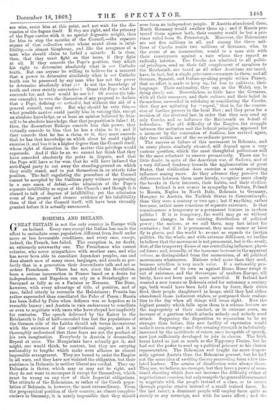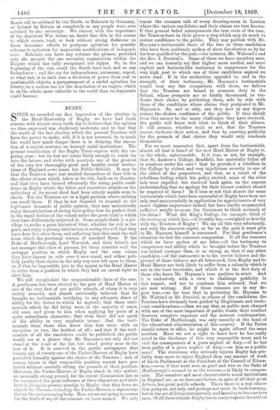BOHEMIA AND IRELAND.
GREAT BRITAIN is not the only country in Europe with an Ireland. Every race except the Italian has made the effort to assimilate some population different from itself under
more or less favourable conditions, and every race, except, indeed, the French, has failed. The exception is, no doubt, an extremely noteworthy one. The Frenchman who cannot colonize, who never sympathizes with another race, and who has never been able to conciliate dependent peoples, can and does absorb men of many races, languages, and creeds so per- fectly that in a generation their descendants talk and act as ardent Frenchmen. There has not, since the Revolution, been a serious insurrection in France based on a desire for independence, and Napoleon can rely on a Strasburgher or Savoyard as fully as on a Parisian or Norman. The Dane, however, with every advantage of title, of position, and of race, failed utterly to reconcile the Holsteiners ; Prussia has rather superseded than conciliated the Poles of Posen ; Russia has been defied by Poles when defiance was so hopeless as to resemble lunacy ; and Austria in vain endeavours to conciliate or even to negotiate with races who have obeyed her implicitly for centuries. The speech delivered by the Kaiser to the Reichsrath is full of half-concealed fear lest the populations of the German side of the Leitha should ask terms inconsistent with the existence of the constitutional empire, and it is thoroughly understood that these fears are not the product of his own imagination. Everybody in Austria is demanding Repeal at once. The Hungarians have actually got it, and might, one would think, be content, but they are carrying nationality to lengths which make even alliance an almost impossible arrangement. They are bound to assist the Empire in all wars, and they have not violated the obligation, but their assistance in Dalmatia is neither liberal nor cordial. They say Dalmatia is theirs, which may or may not be right, and they do not want to reconquer it except for themselves, which must be wrong on any view of their Imperial obligations. The attitude of the Bohemians, or rather of the Czech popu- lation of Bohemia, is, however, the most extraordinary. From the geographical position of their country, an almost complete enclave in Germany, it is nearly impossible that they should ever form an independent people. If Austria abandoned them, North Germany would swallow them up ; and if Russia pro- tected them against both, their country would be but a pro- vince ruled from St. Petersburgh. Moreover, the Bohemians are not five millions in all, and among the three mil- lions of Czechs reside two millions of Germans, who, in the event of an insurrection, would to a man side with their countrymen against a race whom they regard as radically inferior. The Czechs are admitted to all politi- cal privileges, send up their full complement of members to the Reichsrath, are taxed as all other Austrians are taxed, have, in fact, but a single grievance common to them, and all German, Spanish, and Italian-speaking people within France, that no effort is made to keep up, far less to cultivate, their language. Their nationality, they say, as the Welsh say, is dying slowly out. Nevertheless, so little have the Germans, with all their resources, and their culture, and their belief in themselves, succeeded in subduing or conciliating the Czechs, that they are agitating for "repeal," that is, for the conces- sion of further powers to the local Diet ; and they press for a revision of the electoral law, in order that they may send up only Czechs, and so influence the Reichsrath on behalf of federalism. The old difficulty of the Empire, the struggle between the unitarian and the federal principles, appeased for a moment by the concession of dualism, has revived again, this time within one of the co-ordinate powers.
The success or failure of this movement in Bohemia, and in many places similarly situated, will depend upon a very curious question, which the most thoughtful politicians will be the most reluctant to answer prematurely. There can be little doubt, in spite of the American war, of Sadowa, and of a very diffused tendency towards the agglomeration of great States, that civilization does exercise a certain separating influence among races. As they advance they perceive the differences between them more keenly, recognize more clearly the breaks in their interests, their habits, and their civiliza- tions. Ireland is not nearer in sympathy to Britain, Poland to Russia, Naples to North Italy, Bohemia to Germany, Hungary to Austria, the Turkish States to Constantinople, than they were a century or two ago ; but if anything, rather less near, rather more conscious of separate existence. Is that consciousness a temporary or a permanent feature in modern politics ? If it is temporary, the world may go on without immense changes in the existing distribution of political power ; the nations, as we call them, may last intact for centuries ; but if it is permanent, they must sooner or later fly to pieces, and the world b3 re-cast as regards its foreign politics. On the whole, and with extreme diffidence, we incline to believe that the movement is not permanent, but is the result, first, of the temporary disuse of one centralizing influence, physi- cal force; and, secondly, of the immense increase in the apparent volume, as distinguished from the momentum, of all political movements whatsoever. Nations rebel more than they used, because rebellion is very much safer. If a nationality pro- pounded claims of its own as against Rome, Rome swept it out of existence, and the Sovereigns of modern Europe, till lately, have not been much more merciful. If Ireland had wanted a new tenure or Bohemia cried for autonomy a century ago, both would have been held down by force, their cities fired, their people slaughtered in heaps, until they had either abandoned those indiscreet wishes, or postponed their realiza- tion to the day when all things will come right. Now the highest penalty which falls upon them is a solemn lecture on the impropriety of their conduct, or in extreme cases, an increase of a garrison which attacks nobody and nobody need attack. Supposing the disposition to separatism to be no stronger than before, this new facility of expression would make it seem stronger ; and the seeming strength is indefinitely increased by the multitude of voices, once incapable of speech, now just sufficiently developed to join in chorus. The Irish kerne hated us just as much as the Tipperary Fenian, but he had not the power to send up a political prisoner as his chosen representative. The Bohemian serf fought far more desper- ately against Austria than the Bohemian peasant, but he had not the same idea of swelling the cry proceeding from a few iso- lated leaders. The armies of disaffection were always there. They are, we believe, no stronger, but they have a power of com- bined shouting which does not increase the difficulty either of negotiation or coercion, but only compels the general Government to negotiate with the people instead of a class, or to coerce through popular armies instead of a small trained force. In the last resort, a dominant people will employ force quite as sternly as any sovereign, and with far more effect ; and the South will be subdued by the North, or Bohemia by Germany, or Ireland by Britain as completely as any people were ever subdued by any sovereign. We cannot, with the experience of the American War before us, doubt that this is the course to which events tend, or look without strong disfavour on these incessant efforts to postpone agitation for possible reforms to agitation for impossible modifications of independ- ence. Bohemia can have any reforms she pleases, provided only she accepts the one necessity, organization within the Empire which has fully recognized her rights. So, in the beginning of the war, could the South have had, and so can Ireland now ; and the cry for independence, autonomy, repeal, or what not, is in each case a diversion of power from real to unattainable objects, a postponement of a useful agitation for liberty, to a useless one for the dissolution of an empire, which is, on the whole, more valuable to the world than its fragments could become.







































 Previous page
Previous page